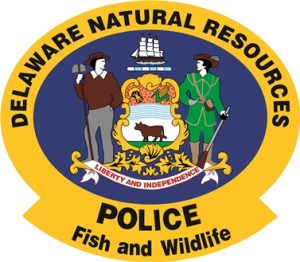Reminder for week: Anglers need fishing license, trout stamp, FIN number for trout season
 DOVER – To achieve public compliance through education and enforcement actions that help conserve Delaware’s fish and wildlife resources and ensure safe boating and public safety, DNREC Division of Fish & Wildlife Natural Resources Police officers between Feb. 22-28 made 1,245 contacts with anglers, boaters, hunters and the general public, including 32 vessel boardings for boating safety and fishing regulation compliance checks. Officers responded to 28 complaints and issued 24 citations, one of which was related to the C&D Canal Conservation Area and associated recreational trail, where there is an increased Fish & Wildlife Natural Resources Police presence.
DOVER – To achieve public compliance through education and enforcement actions that help conserve Delaware’s fish and wildlife resources and ensure safe boating and public safety, DNREC Division of Fish & Wildlife Natural Resources Police officers between Feb. 22-28 made 1,245 contacts with anglers, boaters, hunters and the general public, including 32 vessel boardings for boating safety and fishing regulation compliance checks. Officers responded to 28 complaints and issued 24 citations, one of which was related to the C&D Canal Conservation Area and associated recreational trail, where there is an increased Fish & Wildlife Natural Resources Police presence.
An incident of note:
- On Feb. 27, Fish & Wildlife Natural Resources Police cited Jonathan D. Ryan, 34, of Lewes for one count of possession of marijuana at the C&D Canal Conservation Area near Middletown. Ryan was fined $131 including court costs for the civil violation.
Citations issued this week by offense category included the following, with the number of charges in parentheses:
Wildlife Conservation: Operating a motor vehicle off an established roadway on a state wildlife area (1), trespassing after hours on a state wildlife area (3), hunting snow geese without a Conservation Order number/federal regulation (3), and littering/dumping on a state wildlife area (1).
Fisheries Conservation: Possession of undersized striped bass (2), and possession of undersized white perch (1).
Boating and Boating Safety: Operating an unregistered vessel (1).
Public Safety: Possession of marijuana (3)*, possession of a controlled or counterfeit substance/heroin (1), and possession of drug paraphernalia (1).
Natural Resources Police processed the following charges for Delaware State Police: Criminal impersonation (2), driving without a valid license (1), driving with a suspended or revoked license (2), and speeding in excess posted limits (2).
* One citation for possession of marijuana was issued at the C&D Canal Conservation Area.
Are you AWARE?
DNREC’s Division of Fish & Wildlife Natural Resources Police reminds anglers that with trout season opening downstate at 7 a.m. Saturday, March 5 and other spring fishing opportunities coming up soon, they will need to purchase their 2016 Delaware fishing license and, specifically for trout fishing, a state trout stamp. Trout will be stocked in Tidbury Pond near Dover in Kent County and Newton Pond outside of Greenwood in Sussex County. Both ponds are currently closed to all fishing until opening day on March 5. Upstate, trout season in six stocked trout streams opens at 7:30 a.m. on Saturday, April 2.
A resident annual Delaware recreational fishing license, which covers fresh and tidal waters as well as crabbing and clamming, costs $8.50 for ages 16 through 64. Persons under the age of 16 and residents age 65 and older are not required to purchase fishing licenses in Delaware, although exempt persons may purchase fishing licenses and trout stamps if they so choose to help support fisheries management and trout stocking efforts. For non-resident anglers age 16 and older, a Delaware fishing license costs $20.
Most trout anglers also must purchase a Delaware Trout Stamp, with the exception of anglers younger than age 12 and resident anglers age 65 and older. For residents age 16 through 64, a trout stamp costs $4.20. For residents age 12 through 15, a youth trout stamp costs $2.10. For non-residents, a trout stamp is required for all anglers age 12 and older and costs $6.20.
Both resident and non-resident anglers age 16 and older also are required to obtain a Delaware Fisherman Information Network (FIN) number. The free number is included as part of a Delaware fishing license purchase. License-exempt anglers, including Delaware residents 65 and older, may visit www.delaware-fin.com or call 800-432-9228 toll-free to obtain their free FIN number.
Delaware fishing licenses and trout stamps are sold online, at the licensing desk in DNREC’s Richardson & Robbins Building, 89 Kings Highway, Dover, DE 19901, and by license agents statewide. To find a participating agent, or to purchase a license online, visit Delaware Licenses. For additional information, call 302-739-9918.
For more information on fishing in Delaware, click on 2016 Delaware Fishing Guide. The guide also is available in printed form at DNREC’s Dover licensing desk, and from license agents throughout the state.
DNREC’s Division of Fish & Wildlife recognizes and thanks the majority of anglers, hunters and boaters who comply with and support Delaware’s fishing, hunting and boating laws and regulations. Citizens are encouraged to report fish, wildlife and boating violations to the Delaware Fish & Wildlife Natural Resources Police by calling 302-739-4580. Wildlife violations may also be reported anonymously to Operation Game Theft by calling 800-292-3030 or online at http://de.gov/ogt.
Media Contacts: Cpl. John McDerby, DNREC Division of Fish & Wildlife Natural Resources Police, 302-739-9913 or 302-354-1386, or Joanna Wilson, DNREC Public Affairs, 302-739-9902
Vol. 46, No. 68
